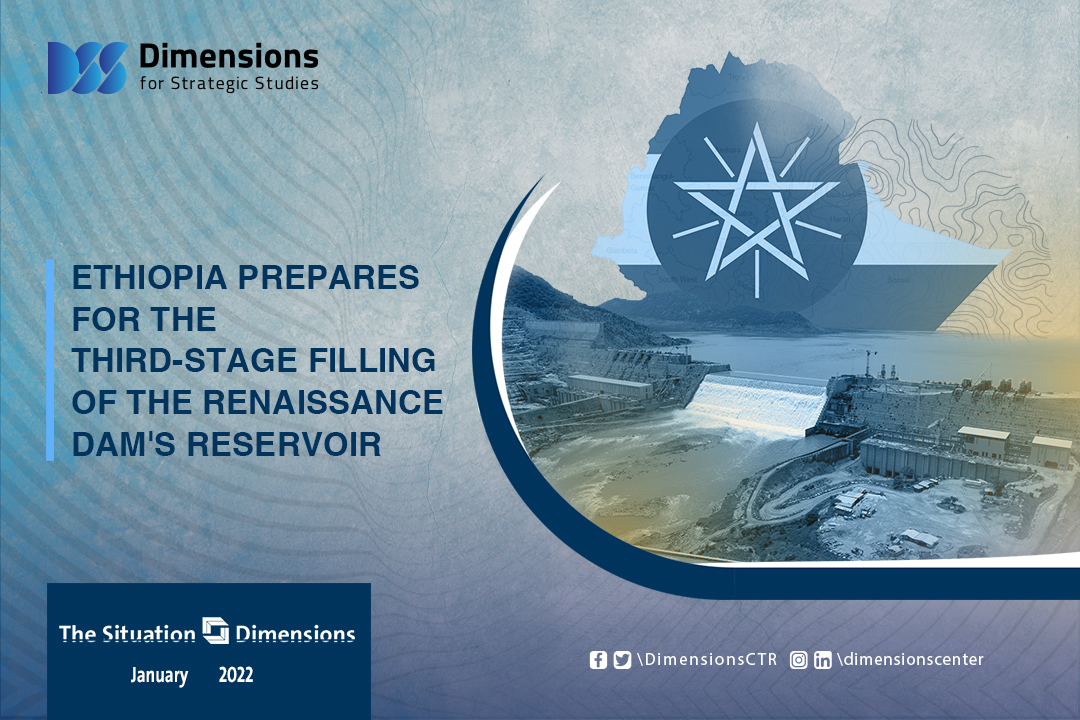
Ethiopia prepares for the third-stage filling of the Renaissance Dam's reservoir
2022-01-182032 view
Ethiopia has officially announced it is beginning to make preparations for the third-stage of filling the reservoir of the Grand Ethiopian Renaissance Dam (GERD). It announced that despite the crisis between the three countries, Sudan, Ethiopia and Egypt has escalated, as each party adheres to its position due to the absence of a binding legal agreement between them.
Negotiations between these countries had frozen following the escalation of the war between the federal government of Ethiopia and the Tigray People's Liberation Front (TPLF). Political developments and turmoil in Sudan also led to block negotiations.
In this regard, intensive meetings were held between Ethiopian officials on January 15, 2022 in the Benishangul-Kumuz region in the west of the country, where the GERD is located. The meetings aimed at discussing preparations for the start of a new phase of clearing forests that extend over an area of 170,000 square kilometers behind the dam's reservoir. Such a move was meant to pave the way for operating the ninth and tenth turbines next February.
One of the meetings, which was held in the city of Asousa (the capital of the Benishangul-Gemuz region), was attended by the Minister of Irrigation, Engineer Aisha Muhammad, and the governor of the region, Al-Shazly Hassan, along with other senior officials.
The second-stage filling had taken place last July. It had also been preceded by the removal of about 49 square kilometers of forests. The forest trees cover an area of an estimated 1,800 square kilometers, and it is scheduled to be completely cleared in the middle of 2023. According to officials, Ethiopia will start producing electricity from the dam, as about 82% of dam construction was completed, with a production capacity of 600 megawatts from two turbines that cover 20% of the country’s needs.
On January 5, Abi Ahmed, the Prime Minister of the Federal Democratic Republic of Ethiopia made an inspection visit to the dam site to observe the final touches before launching the trial energy production. Meanwhile, the Ethiopian Foreign Ministry spokesperson recently stated that this filling stage and the production of electric power do not contradict with the tripartite negotiations on the outstanding issues.
The issue of filling the GERD was one of the biggest obstacles that hindered the continuation of the negotiation processes on the dam between the parties to the tripartite negotiations, namely Sudan, Egypt and Ethiopia. These negotiations are planned to also deal with the issues of operation and joint management of the facility. Prior to that, the goal is reaching a legal and binding agreement for all parties on these issues.
After the failure of the African Union-led mediation, which started since July 2020 on the issue of the dam, the UN Security Council in its last session that was held on July 8 on the GERD also failed to support the position of Egypt and Sudan in finding an international quadripartite mechanism (which includes the United States, the United Nations, and the European Union) in addition to the AU-led mediation. The outcomes of the session supported only the African mediation currently led by the Democratic Republic of the Congo, which chairs the rotating presidency of the African Union.
Moreover, the issue of filling the dam has caused a divergence of positions between Addis Ababa on the one hand, and Khartoum and Cairo on the other hand throughout the negotiation processes that took place between the parties under the auspices of the African Union during the past year. Negotiation processes, however, stopped last April after the failure to reach an agreement between the negotiating parties.
According to the Ethiopian side, the African mediation had offered the parties - in the last round - an interim agreement on filling, while the final agreement to be concluded later. However, this offer was rejected by Sudan and Egypt.
While Khartoum and Cairo insist that the process of filling the dam be carried out in accordance with a legal and binding agreement between the three parties, Addis Ababa, on the other hand insists on moving forward with filling the dam unilaterally and without waiting for the results of the ongoing negotiations that have been underway since 2011, but have not yet reached any agreement between the parties.
In this context, and in an attempt to agree on the positions of the downstream countries (Egypt and Sudan) as well as international calls regarding filling the dam, Ethiopia offered, during the second-stage filling last fall, each of the two countries to send technicians for exchanging information before the filling starts.
The Ethiopian position - in this regard - is based on the fact that all filling operations of the dam fall within the framework of the completion stages of the dam construction. Ethiopia considers that filling stages were already stipulated in the Declaration of Principles that was signed by the leaders of the three countries in Khartoum in 2015.





